
by: SEO Strategist
Ashot Nanayan
Ashot Nanayan is the CEO and Founder of DWI and a seasoned SEO strategist. With a proven track record of...
All Articles by Ashot Nanayan
May 23, 2025
8 min. read
Hiring a full-time SEO expert isn’t always the smartest move, especially when you don’t need someone working 40 hours a week to keep things moving. What sets results apart now is having the right expertise without overcomplicating your workflow.
Agencies and full-time freelancers often come with high retainers or six-figure contracts. That’s exactly why the fractional SEO consultant model has become more popular in recent years; it offers flexibility, senior-level insight, and a smarter way to scale. It can be a practical solution for businesses and provide a high-level plan without operating expenses or long-term contractual obligations.
Some questions are still up in the air: What exactly does a fractional SEO consultant do? Which companies benefit most from this arrangement? Finally, what should you expect to invest in?
In this guide, I will break down everything you need to help you determine if a fractional SEO consultant is the right solution for your business. Stick around, we’ll figure out if this setup fits your goals, or if you’re better off going another route.
In simple words, a fractional SEO consultant is a specialized professional who works part-time for multiple clients, typically dedicating a fixed number of hours per month to each business. Unlike full-time employees or SEO agencies, fractional SEO consultants offer high-level strategic guidance and specialized expertise on a flexible, as-needed basis.
Likewise, you can look at them as your part-time SEO director or fractional SEO manager, delivering top-level strategy without the cost of a full-time hire or the overhead you’d take on if you were to hire an SEO agency.
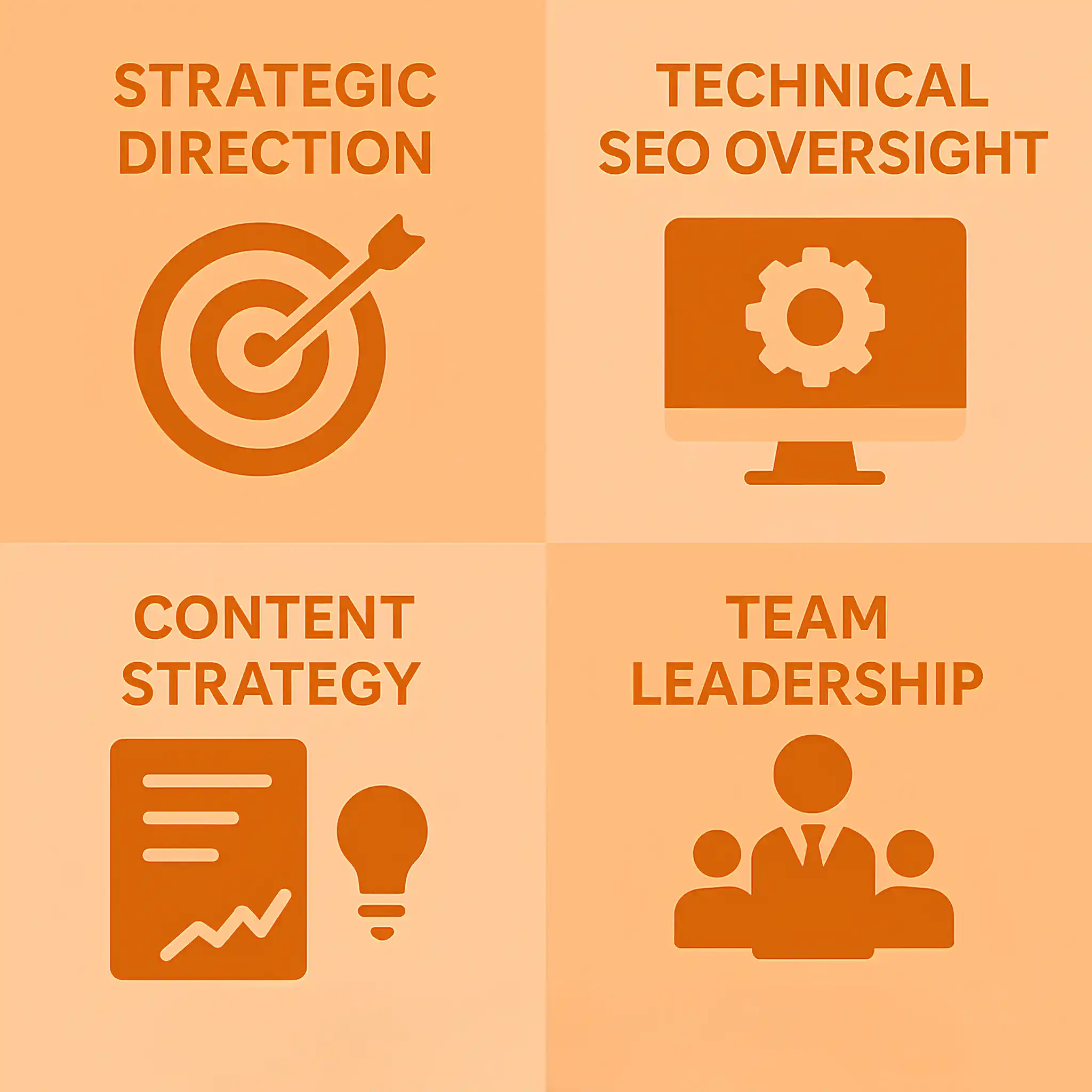
They often help businesses set a clear SEO roadmap, prioritize efforts, fix technical issues, lead content strategy, and guide internal teams or external vendors.
I believe this model is ideal when your business is in a growth phase, launching a new product, recovering from an SEO drop, or scaling content. It’s also perfect if you already have a marketing team but lack someone to lead SEO efforts or manage vendors accountable.
I could go on for hours about the pros and cons of each option, but I figured a clear comparison table would do a better job. Sometimes seeing it all side by side just makes things faster. Whether you’re doing SEO yourself, thinking about hiring a fractional consultant, considering a full-time in-house hire, or going with an SEO agency, each choice comes with its own set of differences.
What works best really depends on where your business is right now and what kind of support you need. I mean, if you’re still considering SEO in-house vs. outsourcing, or wondering where a fractional expert fits in, this should give you a solid perspective.
| Aspect | Fractional SEO Consultant | Full-Time SEO Hire | SEO Agency |
|---|---|---|---|
| Cost | Mid-range, flexible pricing | High salary + benefits | High monthly retainer |
| Expertise Level | Senior-level, specialized | Depends on experience level | Often a mix. May lack deep focus |
| Time Commitment | Minimal oversight needed | Full-time, requires management | Minimal time, but communication gaps common |
| Scalability | Easily scales with business needs | Limited to one person’s capacity | Scalable, but can become costly |
| Speed of Results | Faster, strategic from day one | Moderate, onboarding required | Varies, depends on team and processes |
Most people still think hiring someone for SEO means bringing on a full-time employee, an agency, or a freelancer who disappears after the first round of keyword research. But a fractional SEO consultant isn’t here to fill a job title.
What makes them different from the usual roles is their mindset. A traditional SEO hire often gets caught up in execution: fixing meta tags, writing content outlines, handling redirects, and that’s fine, but not always what a growing business needs. Fractional SEO is about leading with experience, prioritizing important actions, and skipping the unnecessary stuff.
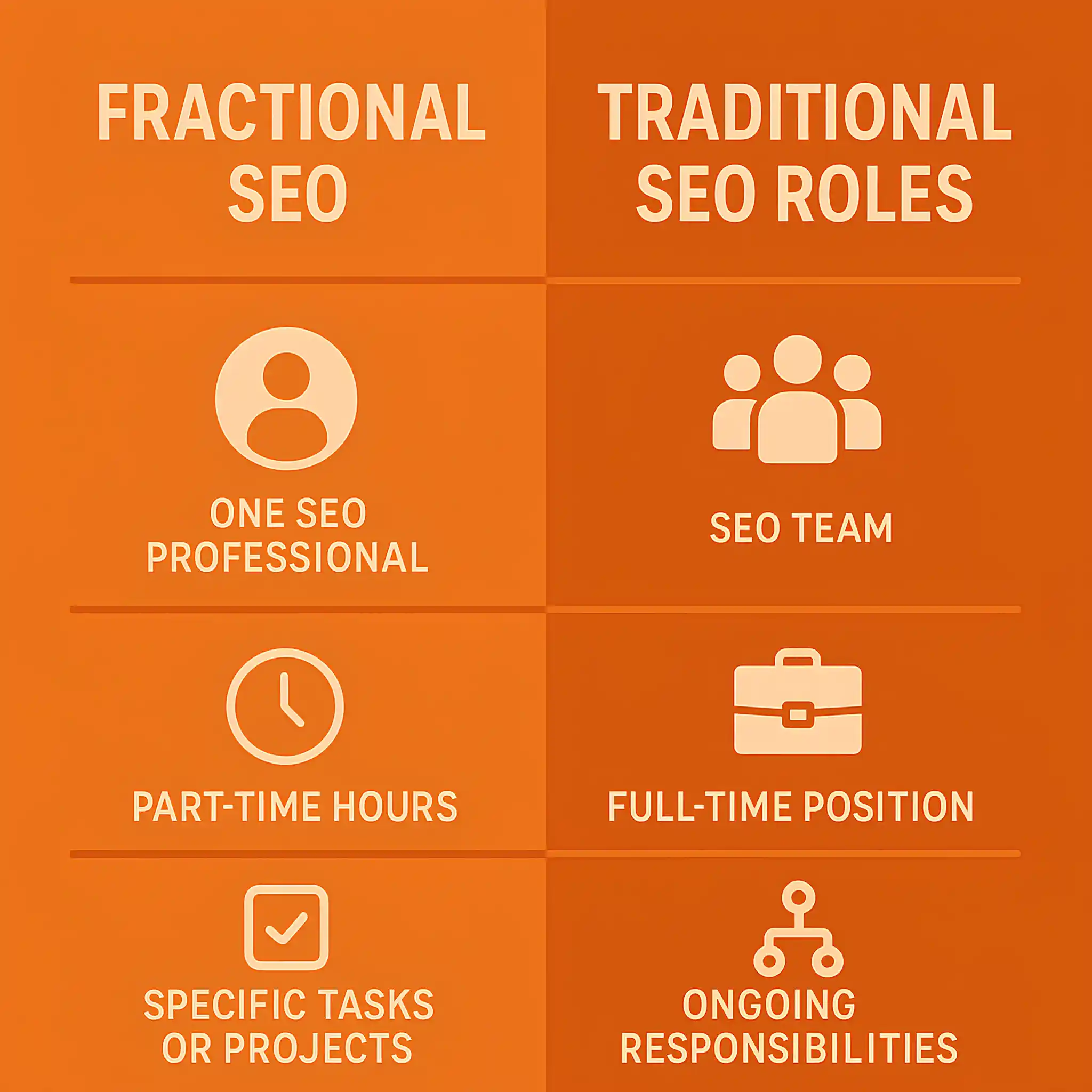
In my opinion, another thing that sets this role apart is how it fits inside your organization. A good fractional SEO doesn’t just drop strategy decks and disappear. They work with your developers, content writers, and product team. They cut through silos and act as a bridge between departments. So instead of just handing off tasks, you’re getting someone who guides, prioritizes, and drives the work forward with your internal team.
I’d say this is one of the topics I’ve researched the most. I spent hours digging into threads on Reddit and Quora, reading questions from business owners, replies from agency leads, and honest experiences from founders who’d already tried the fractional model.
I also paid close attention to what people were saying on LinkedIn, especially in comment sections where things get less filtered and more real. What stood out wasn’t a random pattern. It was clear that certain types of companies kept appearing in those conversations: teams that needed real SEO thinking, not just task execution. Businesses that were past the beginner phase but not ready, or willing to invest in a full-time hire or a big agency.
These are the ones that turn to fractional consultants not because it’s cheaper, but because they need clarity, direction, and strategy from someone who’s been in the trenches.
So here’s what I found when you put it all together in one place.
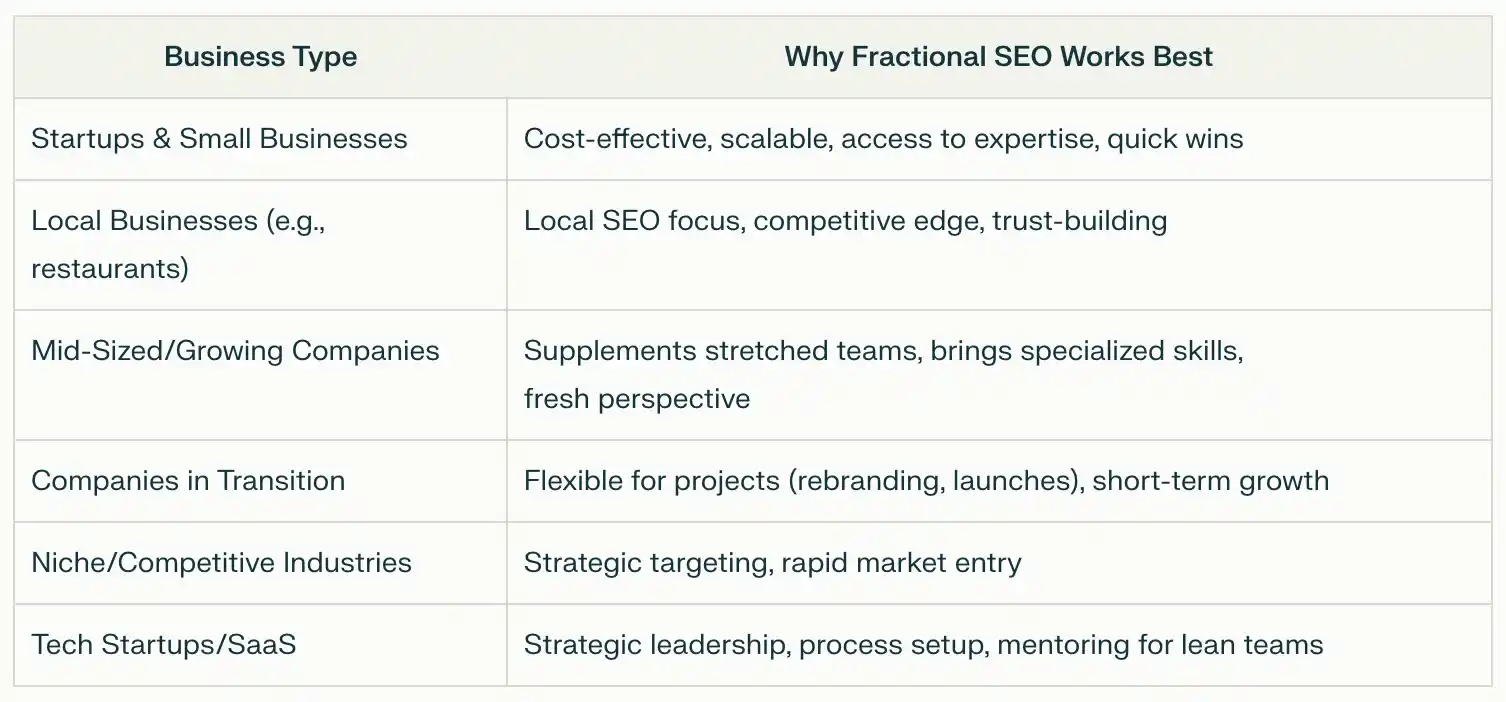
Moreover, in my freelancing career, I’ve stepped in as a fractional SEO consultant for a wide range of businesses, and most of them had one thing in common: they didn’t need someone full-time, but they needed someone who knew what they were doing.
I’ve also worked with teams that already had a basic SEO setup but needed help with very specific situations. For instance, a few clients brought me in just to guide them through a full site migration without losing their rankings. Others asked me to review their backlink profile in detail, flag any risks, and recommend a safer long-term strategy.
In some cases, I was hired to evaluate an entire SEO approach that wasn’t delivering results, so they could finally figure out what was working and what wasn’t. If there’s one thing I’ve learned, it’s that this model fits best when a business knows what it wants but doesn’t want the overhead of hiring in-house or paying an agency a monthly SEO retainer just to get a few key answers.
Their top deliverables usually include a custom SEO roadmap, technical and content audits, keyword research and competitor analysis, and clear, prioritized action plans. They also guide internal teams, monitor performance, and make sure your SEO efforts align with broader business objectives, without the full-time cost.
While exploring a few threads on Reddit and SEO Slack groups, I found some surprisingly honest insights from marketers who’ve worked with fractional SEO consultants. Here are a few that stood out:
But this one is closer to my heart:
So, yeah, when you hire a fractional SEO consultant, you’re not just paying for a report. You’re bringing in someone who knows where growth hides. Someone who doesn’t need two months to “get familiar with your niche” or run ten SEO tools before saying anything useful.
They’ll tell you if your content sucks, if your backlinks are trash, or if you’re targeting the wrong pages altogether.
If you expect someone to write blog posts, build PR backlinks, and handle every detail by hand, let me disappoint you. A fractional SEO consultant won’t do that. You’re hiring them to lead, not to run through a checklist. Some businesses get stuck here as they want a strategy and someone to do all the execution.
They’re not going to sit in every internal meeting, manage junior staff daily, or write every meta description by hand.
This role exists to give you direction, clarity, and progress without you needing to bring someone on full-time. That’s the deal.
Another thing most companies miss: fractional SEOs don’t always have deep involvement across departments. They’ll advise on what to fix in dev or content, maybe even hop on a few calls, but they’re not there to manage your engineers or your writers. If your team is passive or disconnected, don’t expect miracles.
This is honestly the hardest part. Not the audit, not the content plan, not even the execution, and you’ll need a bit of luck because finding someone who knows SEO, cares about the results, and doesn’t just say the right things on a sales call is rare.
Next, before you even look at resumes or portfolios, figure out where your priorities sit. Are you looking for deep technical expertise or someone who’s hungry, sharp, and brings insane motivation? Do you care more about price, or are you okay spending more for actual quality work? Especially if you plan to outsource SEO long-term, the right fit matters even more.
Remember, you can’t have everything.
Unfortunately, today, many so-called experts are doing questionable stuff. Spammy links, AI content farms, expired domain tricks, zero strategy.
Sometimes, they’ll show you charts. But once you’re in, you realize they’re not doing SEO, they’re just playing Google’s loopholes until they stop working.
Start small. Ask for one or two case studies. Real ones. Not unclear success stories. Then ask for referrals. If they don’t have people ready to vouch for them, that’s a red flag.
Better yet, send them your site URL. No prep, no context. Just ask, “What stands out to you right away?” A real fractional SEO consultant won’t need three days to reply. They’ll have a gut instinct and can walk you through it without sounding confused or unsure.
There are a few patterns I’ve learned to spot over time. One of the big ones is when someone talks a lot about deliverables but barely mentions outcomes. I’ve sat through pitches full of timelines, blog post quotas, monthly SEO audits, and pretty dashboards. But when I asked how any of that ties back to growth, leads, or revenue, the answer was unclear.
Pro tip: Deliverables are easy to promise. Ask how they’ll measure success, and make sure it’s not just “organic traffic” but revenue, leads, or conversions. Busy doesn’t always mean better.
Here’s something I wish someone had told me years ago. Stay away from anyone who says they “do everything.” That’s a red flag wrapped in confidence. No one is world-class at technical SEO, content strategy, link building, CRO, local SEO, site speed, and analytics all at once. It doesn’t work like that.
If someone claims they’ll fix your Core Web Vitals, build links from Forbes, write blog posts, restructure your site, and audit your GA4 setup, or organize SEO website migrations, just smile and walk away. It’s like hiring one person to be your lawyer, accountant, therapist, and plumber.
A real fractional SEO consultant knows their craft. They’ll either bring their own team or tell you where they stop and where someone else should step in. That’s the kind of honesty you need. Because if they’re claiming to be everything, chances are they’re not good at any of it.
If you’re expecting a price list, you’re not ready to hire a fractional SEO consultant. This isn’t buying a template or a blog package. Most fractional SEO consultants don’t jump straight into monthly SEO retainers. When you’re just getting started, the engagement is usually hourly or contract-based.

I believe that gives both sides room to figure out if there’s a fit, without locking into something long-term too early.
Hourly pricing is pretty standard in the early phase. On average, in the USA, the hourly rate for a seasoned fractional SEO consultant falls somewhere between $100 to $250. But honestly, it depends heavily on the consultant’s reputation, experience, and the complexity of your site.
Here is the full breakdown by countries:
| Country | Typical Hourly Rate | Monthly Range (Part-Time) | Notes |
|---|---|---|---|
| United States | $100 – $250 | $4,000 – $8,000 | Highest rates; strong demand in SaaS, eCom, B2B. Senior-level preferred. |
| United Kingdom | £70 – £150 | £2,800 – £6,000 | Competitive market; often project-based with clear KPIs. |
| Canada | CAD $90 – $160 | CAD $3,600 – $6,400 | Similar to US but slightly lower; common in tech and local SEO sectors. |
| Australia | AUD $100 – $180 | AUD $4,000 – $7,200 | High hourly rates; used heavily by startups and mid-size firms. |
| India | $30 – $80 | $1,200 – $3,200 | Lower cost but growing demand; strong presence in white-label SEO. |
You’ll also see project-based contracts, usually focused on audits, strategy development, or fixing specific issues. These can range from a few thousand dollars to tens of thousands if you’re working with someone who’s solved enterprise-level SEO problems.
Now, if you’ve already built trust and see long-term value, that’s when a retainer starts to make sense. A monthly retainer model can save money over time while giving you consistent access to someone who understands your business inside out.
If you’re comparing affordable SEO services with bringing on a high-level consultant, don’t expect the pricing to match, and it shouldn’t.
You can find a breakdown of typical models and pricing in our SEO pricing guide.
First of all, if you don’t have a good product or service to begin with, no SEO consultant on earth, fractional or not, is going to fix that. If you’re still stuck figuring out who you are, who your customers are, or how your business even makes money, then you’re way too early.
It’s also a poor fit if you expect someone to handle everything under the SEO sun without giving them any internal support.
I’d also hold off on hiring one if your company isn’t open to change. Fractional consultants don’t arrive to praise you. They arrive to fix what’s broken. If you’re the kind of team that needs ten meetings to change a page title, you’re going to hate working with someone who moves fast and expects decisions.
Finally, if you just want “quick wins” or think you’ll hit page one next week, save your money. Fractional SEO is long-term thinking. Strategic. Intentional. If you have no patience, you’re better off buying ads or crossing your fingers with Fiverr gigs.
You might find additional value in our No-Contract SEO guide
Once you hire a fractional SEO, don’t disappear. They still need direction, context, and your involvement, especially in the first few weeks. Start by creating one simple doc. Call it “SEO Plan” or whatever you want. In it, break down: What’s done, what’s pending, and what’s next.
I usually keep this in Google Sheets or Notion. If your consultant isn’t writing in it or updating it, that’s a problem. You shouldn’t be guessing what’s going on.
Set a fixed meeting time once a week. 30 minutes is enough. During that call, just ask three things: what did we do, what’s stuck, what are we working on this week? That’s it. No need for long presentations.
When they ask for changes, like updating title tags or fixing broken links, don’t let your dev or content team push it aside. One simple SEO fix sitting in a backlog for 3 weeks kills the progress. I always tell clients: if your internal team doesn’t follow through, don’t blame the SEO consultant when rankings don’t move. This isn’t hard, but it takes discipline. If you want results, you can’t just hire a consultant and hope. You have to stay in it with them.
I’ve tested a few different ways to find solid SEO consultants, SEO coaches for advanced tasks, both for my projects and on behalf of clients. Some platforms look promising at first, but lead to a lot of noise. Others show people who know what they’re doing.
Here is what my insights look like:
GrowthMentor is a good place if you’re in the early stages. I’ve used it when I needed quick input or just wanted to bounce ideas off someone with relevant experience. It’s great for short calls, especially if you’re still figuring out what kind of help you need.
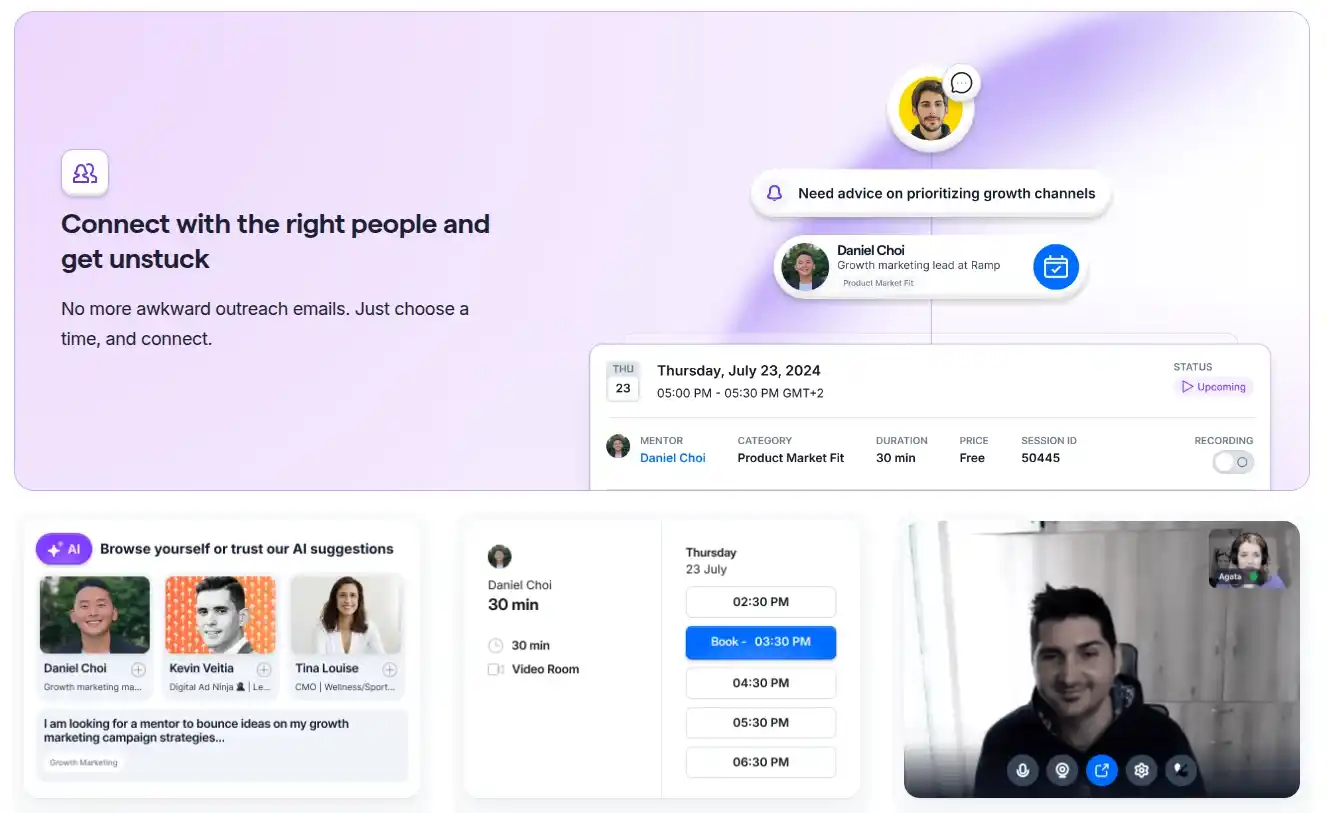
Use the platform to interview, not just learn.
GrowthMentor calls are a great way to evaluate future hires or long-term consultants. If they can explain things clearly in 20 minutes, they’re probably good at leading teams too.
LinkedIn is another big opportunity. I’ve found consultants there just by paying attention to who’s posting thoughtful content, not just sharing SEO wins. If someone is writing clearly about the kinds of problems your business is facing, it’s usually worth starting a conversation.
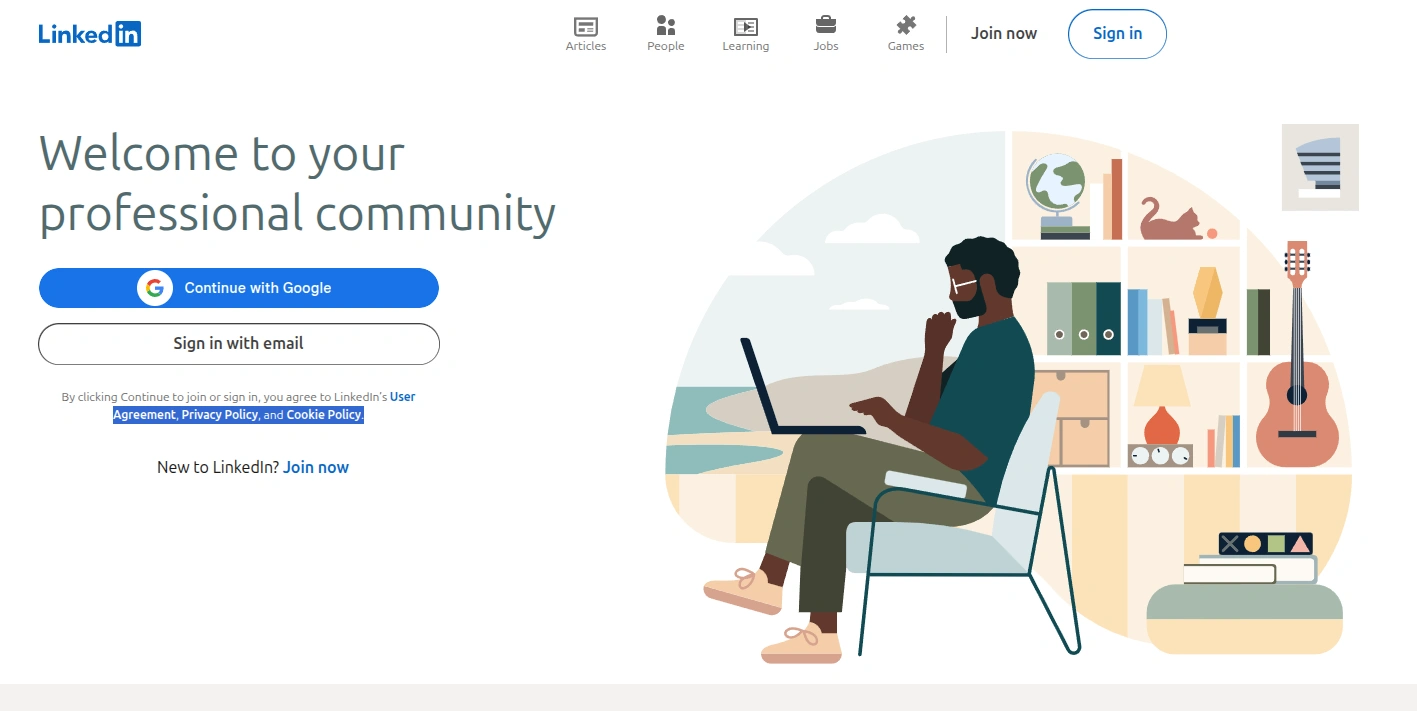
But the platform I keep going back to is Upwork. I know it has a mixed reputation sometimes, but when you know what you’re looking for, it’s surprisingly effective. You can filter based on actual results, see how they’ve handled similar work, and get a sense of their communication style before the first call.
I’ve found some of my best collaborators there. Those were people who understood the brief right away, asked smart questions, and got to work without hand-holding.
Some consultants on platforms like GrowthMentor sound great on paper, but can’t translate strategy into action. Always dig into what kind of clients they’ve actually helped.
Most people hire SEO help the same way they buy a fridge. They read a few reviews and hope it works when it arrives. That’s a mistake, especially with fractional SEO consultants, where strategy and thinking matter more than a list of deliverables.
Ask them how they approach messy SEO histories. I mean the kind where the last three agencies left a mix of half-baked strategies, random backlinks, broken redirects, and overloaded CMS templates.
See if they only rely on general tools or if they start by asking to see what you’ve already tried and why it didn’t work.
Push them on how they think. Not what they deliver. Ask what they’d do if your traffic dropped by 40% out of nowhere. Ask what they’d look at first. Ask what they think most SEOs waste time on.
If they dance around pricing or give you that “it depends” answer without backing it up with real scenarios, at least that’s not acceptable.
The best consultants have opinions. Strong ones. They’re not afraid to say, “I wouldn’t waste your time on that” or “This is your actual problem.” Remember, you’re hiring someone who doesn’t need a hundred-page audit to know what’s broken.
If you’re considering bringing in a fractional SEO consultant, here’s what I’ll say after working on both sides of it; it works best if you’re clear on what you need and ready to let someone lead. This model is far away from handling off to-do lists, tracking clicks, or fixing tweaks. It doesn’t complicate things, it helps to establish focus and strategy.
It delivers real results, seriously. So if you’re ready for that, a fractional SEO expert can be the one moving things forward without the cost or weight of a full-time hire.
A fractional SEO can do both, depending on your needs. Some focus strictly on high-level strategy and recommendations, but many also take on a leadership role, guiding internal marketing teams, coordinating with content writers and developers, and holding vendors accountable. They act as your part-time SEO lead, making sure everyone is aligned and executing against the right objectives.
Yes, and it’s often the first step. A fractional SEO will usually review your previous strategies, analytics, and outcomes to identify what worked, what failed, and what’s missing.
Yes, fractional SEO can be a great fit for startups that need high-level strategy without the cost of a full-time hire. It’s especially useful when you’re still testing product-market fit, scaling content, or preparing for funding. You get flexible commitment and faster execution, all without wasting your budget.